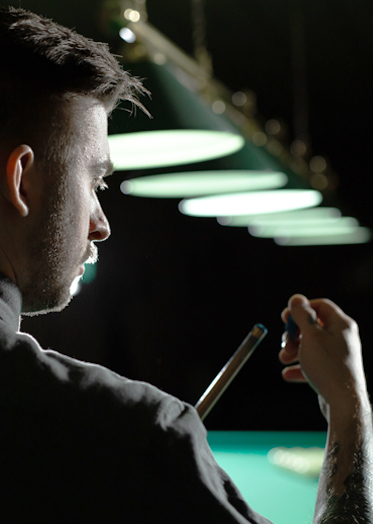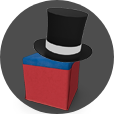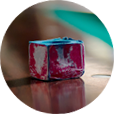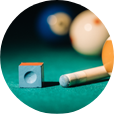What Does Chalk Do In Pool? Understanding the Magic of Chalk and Getting the Perfect Cue Tip Grip

Have you ever pondered over "what does chalk do in pool"? While it may seem like a simple routine, the practice of chalk application is crucial for optimal pool playing. In this article, we'll delve into the science behind pool chalk and explore why it's considered an indispensable tool. We'll answer questions like, "Why do you put chalk on a pool cue?" and "What is pool chalk made of?" Join us as we unravel the secrets behind this unassuming cube of chalk and discover why it plays an important role in optimizing your performance on the billiards table.
The Magic of Pool Chalk
Ever wonder why that little cube of chalk is always within arm's reach of any pool player? There's more magic in pool chalk than you might think. Let's break down the wonders of this essential billiards tool.
What Is Pool Chalk Made Of?
Pool chalk isn't like your ordinary classroom chalk. It's specially made with a substance called silica, which has a gritty texture. This grit is key to making magic happen on the pool table.
Why Do You Put Chalk on a Pool Cue?
When you apply chalk to the tip of your cue, it's like giving your cue the ability to grip the ball better. Without pool chalk, the cue tip can easily slide off the ball, causing a miscue. But with chalk, the cue tip grabs onto the ball just a bit longer, making your shot more precise.
What Does Pool Chalk Do to Give You Spin?
Ever seen those cool shots where the ball spins like crazy? Pool cue chalk is behind that, too. It helps you put the right amount of spin on the ball, giving you control that would be almost impossible otherwise.
How Do You Avoid the Dreaded Miscue?
Pool cue chalk has a hand in helping you avoid miscues. A miscue is when the cue tip doesn't hit the ball squarely, causing the cue ball to go in an unintended direction. It's every pool player's nightmare. But a well-chalked cue tip can help prevent this by providing the extra grip needed to hit the ball accurately.
How to Use Pool Chalk Properly
You might notice that seasoned players chalk their cues lightly and evenly. That's because too much pool chalk causes a mess on the balls and the table, which can actually affect how the balls roll and react.
Chalk It Up to History: The Evolution of Pool Chalk
Ah, pool chalk. That little cube sits quietly by the pool table, waiting for its moment to shine. Ever wondered how this tradition of chalking up started? Check out this brief history and see how pool chalk became the unsung hero of cue sports.
- Early Days: Cue chalk has been around since the early 1800s, but it wasn't until 1897 when world-class billiards player William Spinks teamed up with chemist William Hoskins to develop and patent the pool cue chalk that most resembles what we use today.
- Evolution of Chalk: Over the years, the composition of pool chalk has evolved. The rough classroom chalk turned into a specially formulated cube designed for pool cue tips. Its color changed, too, from white to green and eventually to the blue we recognize today. This evolution was all about finding the perfect formula to reduce miscues and enhance gameplay.
- Modern-Day Magic: Today, pool cue chalk is an essential part of the game. The little cube has come a long way, with various brands offering different formulations. Some promise better grip, others a cleaner game with less residue. But no matter the brand, the essence of pool chalk remains the same – to help players make accurate shots and show off their skills on the pool table.
- A Nod to Tradition: Despite all the advancements in cue sports, the tradition of chalking up before a shot remains a timeless ritual. It's a nod to the historical essence of the game, reminding us of the simple yet impactful innovations that have shaped billiards. As well as having practical applications, experienced players find that chalking their cue gives them a moment to reflect on how they'll approach their next shot.
So, the next time you see someone chalking up their cue, you'll know there's a lot more going on than just routine. It's about prepping for that perfect shot and letting the magic of pool chalk work in your favor. And hey, now that you're in the know, you'll be able to appreciate that little cube of chalk a bit more the next time you line up a shot.

Using Pool Chalk to Achieve the Perfect Cue Tip Grip
Getting that perfect grip on the cue ball is like finding the sweet spot in a good handshake. It's not too loose, not too tight, but just right. A significant part of achieving this lies in how you chalk your cue tip. Let's break down the steps to get that ideal cue tip grip that could very well be your game-changer.
Step 1: Pick Your Pool Chalk Wisely
Not all chalks are created equal. Some provide better grip, while others leave less residue. It might take a few tries to find the one that sits well with you, but it's worth the effort. Pro Tip: You'll find some of the best pool chalk at FCI Billiards.
Step 2: The Right Amount of Chalk
When it comes to chalking, less is often more. Apply a thin, even layer of pool chalk to the cue tip. Too much chalk can create a dusty mess on the table and balls, which can affect your game.
Step 3: Chalking Technique
Hold your cue steady and lightly brush the chalk across the cue tip in a rotating motion. Make sure to cover the entire surface without over-chalking. It's about creating a nice matte finish, not a chalk cake.
Step 4: Checking Your Work
Give your cue tip a quick look to ensure the pool chalk is evenly distributed. The goal is to see a uniform coverage without any caked or loose chalk.
Step 5: Practice Makes Perfect
Like anything in pool, mastering the art of chalking takes practice. Each time you chalk up, you're not just prepping your cue, you're honing your skills. Practice your chalking technique as religiously as you practice your shots.
Step 6: Adjust Based on Feedback
Pay attention to how the cue ball responds to different chalking techniques and adjust accordingly. Over time, you'll find what works best for you and your playing style.
Extra Tip
Maintaining a well-shaped and clean cue tip is as crucial as chalking it right. Ensure your cue tip is in good condition to make the most out of every chalk-up.
Frequently Asked Questions About Pool Chalk
While we've addressed the question, "What does chalk do in pool?" there are other questions associated with this topic. We've answered some of them below – please let us know if you'd like more information on this topic.
How Often Should I Chalk My Cue?
It's a good practice to chalk your cue before every shot. However, the frequency may vary depending on the type of shot and personal preference.
Does the Color of the Pool Chalk Matter?
The color of your pool cue chalk doesn't affect its performance, but it can leave residue on the cue ball and the table. Blue and green chalk are standard, as they tend to match the color of the felt.
Are All Pool Chalks the Same?
No, different brands have varying formulations. Some chalks provide a better grip, while others are designed to leave less residue.
Can I Use Regular Chalk Instead of Pool Chalk?
It's not advisable to use regular chalk as it lacks the gripping properties of pool chalk and can damage the cue tip and the billiard cloth.
Do You Need a Pool Chalk Holder?
A pool chalk holder is a handy accessory. It keeps your chalk easily accessible, reduces the chance of losing it and helps keep the pool area cleaner by providing a designated spot for the chalk. Many players find having a chalk holder convenient and a time-saver during games.
Get the Best Pool Chalk at FCI Billiards
Take a cue from the pros and invest in the best pool chalk to enhance your game at FCI Billiards. We believe the right pool cue chalk is a game-changer, and we're here to equip you with all the pool chalk you need from the brands you trust. Make us your one-stop supplier for chalk, pool cues and all the gear you need for a satisfying game of pool. Shop today!
Top 10 SECRETS of a Good DRAW/Backspin/Screw-Back SHOT
PBIA Master Instructor Dr. Dave and Samm Diep demonstrate these secret tips for improving your backspin (aka bottom-spin or screw-back).
Related Articles
 How to Clean a Pool Table: Tips and Tricks for Pool Table Maintenance & Cleaning
How to Clean a Pool Table: Tips and Tricks for Pool Table Maintenance & Cleaning
Whether you're an amateur, professional or somewhere in between, knowing how to clean a pool table is very important. We'll discuss everything you need to know regarding pool table maintenance, including how to clean chalk off pool table felt.
 How to Choose the Best Pool Cue Tips to Improve Your Game
How to Choose the Best Pool Cue Tips to Improve Your Game
Choosing the best pool cue tips for your playing style is one of the most important choices you can make to improve your game. The pool cue tip is where all the energy from your cue is transferred to the cue ball (with some help from chalk) to create accuracy, spin and speed in every shot.
 Pool Cue Storage Guide: How to Up Your Game by Storing Pool Cues Properly
Pool Cue Storage Guide: How to Up Your Game by Storing Pool Cues Properly
Pool cue storage is always an exciting topic amongst billiard enthusiasts. While most pool players agree that a well-maintained stick can elevate your play, there are disagreements on how to store pool cues and keep your cue stick playing like new.
Recent Posts
-
June 2, 2023 By FCI Billiards Looking for the best pool cue case? Other than a high-quality cue …Feb 22nd 2026
-
January 22, 2025 By FCI Billiards When your game has progressed beyond the basics, it may be ti …Jan 22nd 2025
-
December 6, 2024 By FCI Billiards A pool cue tip may not be the most exciting piece of equipmen …Dec 6th 2024









